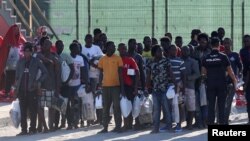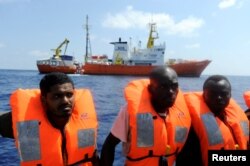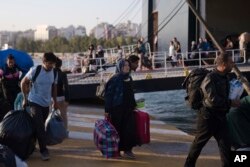Five European Union countries struck a deal Tuesday to distribute between them 58 migrants rescued in the Mediterranean Sea and left stranded by continuing disagreements in the bloc over how to cope with the influx of people trying to enter illegally from North Africa.
A Spanish official who wasn't authorized to be named in media reports said Spain, France, Portugal, Germany and Malta agreed to take the migrants, who were rescued by charities off Libya last week but then stuck on a private rescue ship because it couldn't find a country which would let it dock.
The breakthrough came after days of uncertainty, with EU countries either reluctant to act on the divisive migrant issue or determined to halt the migrant flow. Humanitarian boats loaded with rescued migrants are increasingly shunted between European governments under political pressure to stem newcomers.
All the migrants from the Aquarius 2 rescue ship will disembark in Malta, and Spain will take 15 of the passengers, according to the official. Earlier, Portugal had said it would take 10 of the migrants. The other EU countries did not immediately specify how many they would accept.
Malta said it would send a military boat to take the migrants to shore, before they proceed to the other European countries.
Because the ship had its Panama registration flag yanked earlier, it will sail to its home port in Marseille, France, to “rectify its stateless position” after the migrants disembark, the Maltese government said in a statement.
Humanitarian groups SOS Mediterranee and Doctors Without Borders operate Aquarius 2. It is the sole private rescue boat operating near the deadly central Mediterranean human trafficking route, and Panama’s decision to remove its registration threatened to put it out of action.
Panama’s maritime authority said it made the move after Italy’s anti-migrant leaders complained the boat’s captain failed to follow orders. It said Italy argues the captain of Aquarius 2 defied instructions to return migrants to Libya that it had rescued from unseaworthy vessels launched by Libyan-based traffickers.
But the humanitarian groups say violence-wracked Libya doesn’t meet international standards for safe harbor.
Meanwhile, about 400 asylum-seekers who had been held in the severely overcrowded Moria migrant camp on the Greek island of Lesbos arrived Tuesday in Greece’s main port of Piraeus to be transferred to other camps and residences on the mainland.
The asylum-seekers, mainly families from Syria, Afghanistan and African countries, arrived Tuesday onboard an overnight ferry from Lesbos. They were among around 2,000 people whom the government has pledged to move out of Moria, a facility built for 3,100 people but which is at nearly three times capacity.
Charities have slammed conditions in the camp, citing cases of sexual attack, deplorable sanitation and an increase in suicide attempts among residents.















